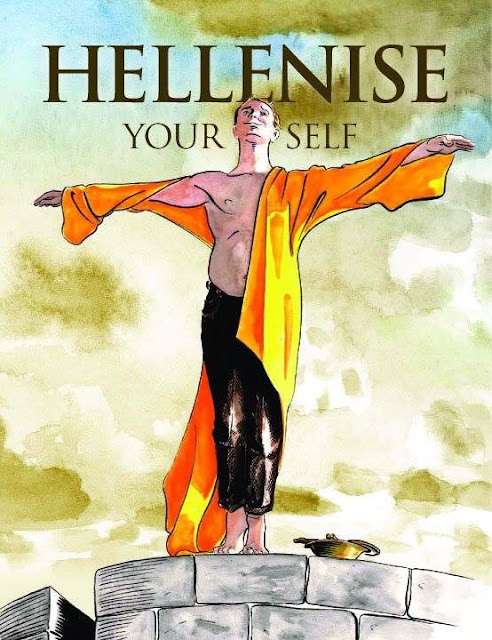ARTICLE AD BOX
 |
| Marilyn catches up on Molly's breathless soliloquy in Joyce's Ulysses |
... and of course, it's Bloomsday! June 16, the day Leopold Bloom famously and fictionally wandered across Dublin to rediscover life and love.
Hence, Bloomsday.
"What people really want to do on Bloomsday is dress up, read aloud and drink lots of Guinness," says the manager of Dublin's James Joyce Centre. Nothing wrong with that. Just like Bloom himself, who enters a Dublin pub "blue mouldy for the want of that pint."
We know how he felt entering yonder establishment 'cos his interior monologue is most of the script. Bloom is a fellow whose interior monologue is easy to enjoy.
 There are Bloomsday celebrations every year from Montreal to Buenos Aires, even "Bloomsday breakfasts" featuring Bloom's favourite, "grilled mutton kidneys which gave to his palate a fine tang of faintly scented urine.” Nice if you like that sort of thing.
There are Bloomsday celebrations every year from Montreal to Buenos Aires, even "Bloomsday breakfasts" featuring Bloom's favourite, "grilled mutton kidneys which gave to his palate a fine tang of faintly scented urine.” Nice if you like that sort of thing.James Joyce once said his novel Ulysses was meant to provide a picture of Dublin so complete that if the city suddenly disappeared, it could be reconstructed through the book. But Joyce said many things, only some of them seriously.
Ninety years after its first appearance (and seventy after its last ban), Joyce’s novel still divides opinion. Even among folk I admire. Ayn Rand enthusiast Harry Binswanger, for example, dismisses it as “trash.” "The book," he says, "is practically impossible to read — the reason for its snob appeal."
Joyce's style [alternates] between gibbering wordplay ("mellow yellow smellow") and ponderous, woozy abstractions ("tentative velation"), the style conforming to Plato's dichotomy between perceptual concretes and ineffable abstractions.And yet it seems to me he's missing something -- not least the joy. (Maybe he needs to spend more time drinking Guinnes in the company of Irishmen?)
Embracing the joy and wordplay (and helping to explain much of it) another of my favourite novelists, Anthony Burgess, reckons Joyce wrote the book “not just to rival classical achievement, but to contain it.” Not to
dismiss romanticism but to extend it. Not to give meat to cloistered pedants and “bloody owls,” but to entertain, to enhance life, to give joy… Ulysses is a great comic novel.. it is part of a total, cosmic laughter that takes in drains, love, politics, and the deathless gods, and feels guilty about nothing. Joyce…accepts the world as it is and relishes man’s creations (why, otherwise, glorify and art or science in every chapter except the last?). It is ultimately an affirmative journey around the traps (the book ends with a "yes"-- a whole exhilarating series of them). Burgess maintains Joyce offers us a challenge, and as Ulysses’s Molly Bloom asserts at the end of the novel, part of being fully aware, fully alive, is saying “yes” to that challenge:
When we have read Joyce and absorbed even one iota of his substance, neither literature nor life can ever be quite the same again. We shall be finding an embarrassing joy in the commonplace, seeing the most defiled city as a figure of heaven, and assuming, against all odds, a hardly supportable optimism.He's right you know.
It’s not a quick read. But nor should you want to hurry. (Think of it, if you like, as an Infinite Jest but for adults.) One reader recounts the challenge:
I first started reading Ulysses in the late 1990s, as an undergraduate at University College Dublin. It seemed so vast to me, like something I'd never be able to crack. There it was with its sepia and green cover, with an image depicting the River Liffey. It was almost as if its size and physicality were mocking my love for the instant gratification provided by frivolous computer games (and my comically short attention span).
But I dived in. I read it with expert annotations, read it with friends, read it alone, gave up, started again, laughed, cried, and then gave up once more. It became like a friend, though. One I felt I partially understood, and yet would probably never fully know. To this day, I have not read it through over a continuous period. Instead, I have digested it in parts over about five years.Take the advice and Dive In! You won't regret it. Ulysses is nine-hundred pages of brawling, sprawling, fabulous, crapulous, life-giving reflection and rambunctiousness. Like that reader above, I've only twice read it straight through, but mostly in parts at a time, enjoying their relation to the whole. And like Atlas Shrugged, I look forward to enjoying reading, re-reading and thinking about it for the rest of my life. (I don't see that I need to choose between them.)
Enjoy!










 English (US) ·
English (US) ·